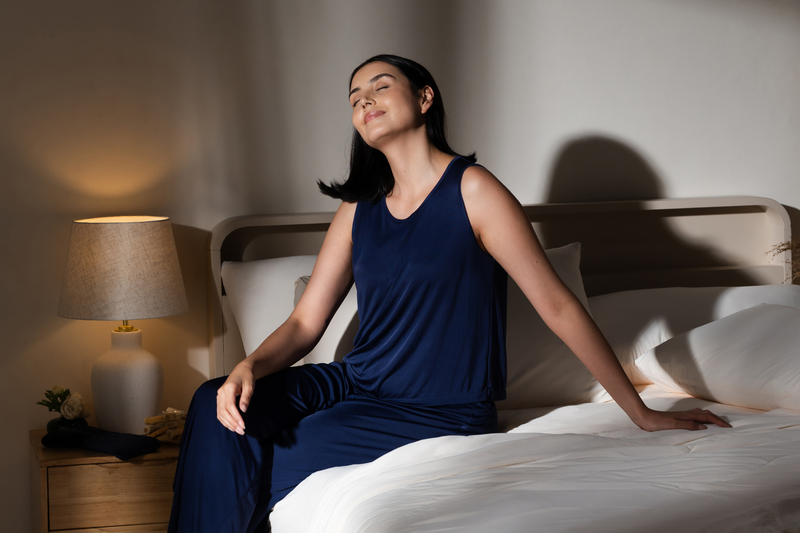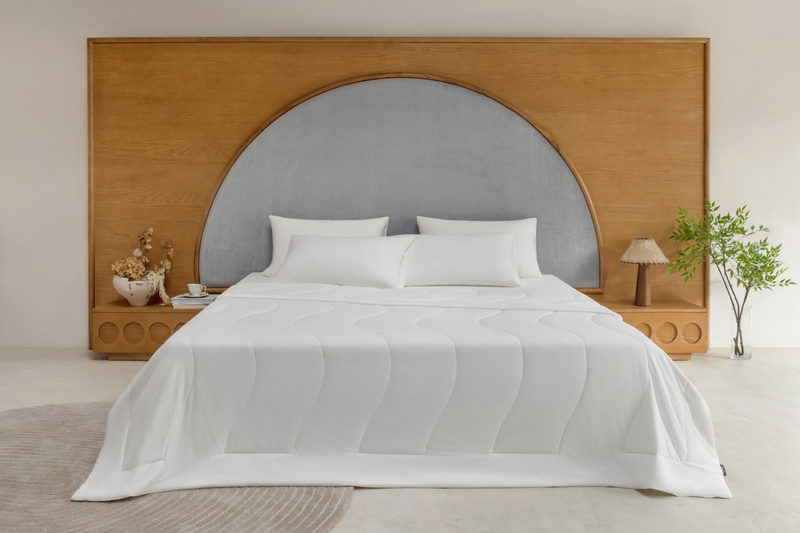Summer Solstice: The First Day of Summer

What is the Summer Solstice?
TL;DR:
The summer solstice is an astronomical event that occurs when one of the Earth's poles is tilted at its maximum toward the sun. This happens around June 21st in the Northern Hemisphere and December 21st in the Southern Hemisphere. On this day, the sun reaches its highest position in the sky at noon, resulting in the longest day and shortest night of the year.
The summer solstice has been celebrated for centuries in various cultures with festivals, rituals, and gatherings, marking it as a time of renewal, fertility, and the triumph of light over darkness. Scientifically, the solstice occurs due to the tilt of the Earth's axis, which is angled at approximately 23.5 degrees relative to its orbit around the sun.
Summer Solstice’s Impact on Sleep Health
Sunlight plays a critical role in regulating sleep patterns. Natural light exposure, particularly in the morning, helps set the body's circadian rhythm, which dictates the sleep-wake cycle. Insufficient exposure to daylight can delay sleep onset and reduce sleep quality.
As night falls, our body's internal clock triggers the release of melatonin, signaling it's time to sleep. With the arrival of daylight, melatonin production halts, preparing the body to wake up and start the day. This natural cycle of darkness and light is essential for regulating our sleep-wake rhythms.
However, because of the longer daylight hours in summer, melatonin production can be delayed, making it harder to fall asleep. The abundance of natural light, especially in the evenings, can disrupt your sleep-wake cycle, leading to restless nights.
To mitigate these effects, it is advisable to use blackout curtains to block out excess light and maintain a consistent sleep schedule. Ensuring good sleep hygiene during this time can help in adjusting to the longer days and taking advantage of the natural light for better overall health and well-being.
When is the Summer Solstice in 2026?
The summer solstice is happening on June 21 in 2026.
Why Do They Call a Solstice “a Solstice”?
The term "solstice" comes from the Latin words "sol," meaning sun, and "sistere," meaning to stand still. During a solstice, the sun's apparent movement in the sky reaches its northernmost or southernmost point before reversing direction. This gives the impression that the sun stands still at its highest or lowest point in the sky.
Is the Summer Solstice the Beginning of Summer?
Summer officially starts on the solstice because it marks the point when the sun reaches its highest position in the sky and is when the Northern Hemisphere experiences its longest day and shortest night. This astronomical event is a clear marker for the beginning of the summer season in many cultures and calendars, particularly in the Gregorian calendar used widely today.
The tilt of the Earth's axis means that after this date, days start to get shorter as the season progresses towards autumn. Extended daylight during the summer months plays a crucial role in enhancing both mood and sleep quality. Increased exposure to natural light helps regulate our circadian rhythms, making it easier to maintain a consistent sleep schedule. However, excessive exposure, especially during evenings can delay your sleep patterns, and utilizing curtains may help ensure timely melatonin secretion for bedtime.

Why Is the Solstice Not the Start/End of the Year?
The solstice is not considered the start or end of the year because the Gregorian calendar, which is widely used today, is based on the solar year, not solely on solstices. The calendar year starts on January 1st, which is a fixed date that doesn't correspond with the astronomical events of the solstices. However, solstices still play a crucial role in understanding the passage of time and the changing seasons, which can affect sleep patterns throughout the year.
Why Are Days Shorter in the Winter Time?
The opposite of summer solstice is called the winter solstice, which is the day with the shortest period of daylight. This occurs during winter in the Northern Hemisphere, where the Earth’s axis is tilted away from the sun, resulting in less direct sunlight and shorter days. This axial tilt causes the sun to take a shorter and lower path across the sky. Shorter days and longer nights can disrupt sleep patterns and contribute to seasonal affective disorder (SAD), impacting overall sleep quality.
What Is the Meaning of 'The Longest Day'?
"The Longest Day" refers to the summer solstice, the day of the year with the most extended period of daylight. In the Northern Hemisphere, this occurs around June 21st. The term underscores the fact that on this day, the sun is at its highest point in the sky and provides the most hours of daylight.
The extended daylight can help improve sleep by promoting a natural sleep-wake cycle and reducing the likelihood of sleep disorders. The abundance of natural light can improve sleep quality by enhancing the body's production of serotonin, which regulates sleep-wake cycles.
How to Use the Evercool® Cooling Comforter for Optimal Sleep during Summer
To get the most out of your Evercool® Cooling Comforter, consider the following tips:
-
Maintain a Cool Bedroom: Use fans or air conditioning to keep your bedroom at a comfortable temperature. The Evercool® Cooling Comforter works best in a cool environment where it can efficiently regulate your body heat.
-
Darken Your Room: Use blackout curtains to block excess daylight, helping your body prepare for sleep. A darkened room will complement the cooling effects of the Evercool® Cooling Comforter, making it easier to fall asleep and stay asleep.
-
Consistent Sleep Schedule: Stick to a regular sleep schedule, even during the longer days of the solstice. Going to bed and waking up at the same time each day can help stabilize your sleep-wake cycle and improve your overall sleep quality.
As the summer solstice brings longer days and shorter nights, maintaining a comfortable sleep environment becomes essential. Extended daylight can affect your sleep patterns, making it harder to cool down and relax at night. This is where the Evercool® Cooling Comforter comes in, designed specifically to enhance your sleep quality, even during the warmest nights of the year.








